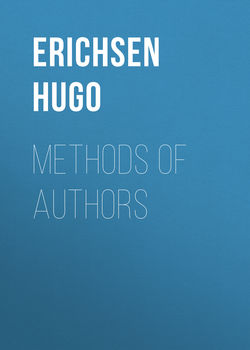Methods of Authors

Реклама. ООО «ЛитРес», ИНН: 7719571260.
Оглавление
Erichsen Hugo. Methods of Authors
PREFACE
I. Eccentricities in Composition
II. Care in Literary Production
III. Speed in Writing
IV. Influence upon Writers of Time and Place
V. Writing under Difficulties
VI. Aids to Inspiration
VI. Favorite Habits of Work
VII. Goethe, Dickens, Schiller, and Scott
VIII. Burning Midnight Oil
IX. Literary Partnership
X. Anonymity in Authorship
XI. System in Novel Writing
XII. Traits of Musical Composers
XIII. The Hygiene of Writing
XIV. A Humorist's Regimen
Отрывок из книги
The public – that is, the reading world made up of those who love the products of authorship – always takes an interest in the methods of work adopted by literary men, and is fond of gaining information about authorship in the act, and of getting a glimpse of its favorite, the author, at work in that "sanctum sanctorum" – the study. The modes in which men write are so various that it would take at least a dozen volumes to relate them, were they all known, for: —
This refers to Madame de Staël, who, when writing, wielded a "little feathery wand," made of paper, shaped like a fan or feather, in the manner and to the effect above described.
.....
"A man would do well to carry a pencil in his pocket, and write down the thoughts of the moment. Those that come unsought are generally the most valuable, and should be secured, because they seldom return." This was the advice of Lord Bacon, whose example has been followed by many eminent men. Miss Martineau has recorded that Barry Cornwall's favorite method of composition was practised when alone in a crowd. He, like Savage, also had a habit of running into a shop to write down his verses. Tom Moore's custom was to compose as he walked. He had a table in his garden, on which he wrote down his thoughts. When the weather was bad, he paced up and down his small study. It is extremely desirable that thoughts should be written as they rise in the mind, because, if they are not recorded at the time, they may never return. "I attach so much importance to the ideas which come during the night, or in the morning," says Gaston Plante, the electrical engineer, "that I have always, at the head of my bed, paper and pencil suspended by a string, by the help of which I write every morning the ideas I have been able to conceive, particularly upon subjects of scientific research. I write these notes in obscurity, and decipher and develop them in the morning, pen in hand." The philosopher Emerson took similar pains to catch a fleeting thought, for, whenever he had a happy idea, he wrote it down, and when Mrs. Emerson, startled in the night by some unusual sound, cried, "What is the matter? Are you ill?" the philosopher softly replied, "No, my dear; only an idea."
George Bancroft, the historian, had a similar habit. His bedroom served also as a library. The room was spacious, and its walls were lined, above and below, with volumes. A single bed stood in the middle of the apartment, and beside the bed were paper, pencil, two wax candles, and matches; so that, like Mr. Pecksniff, Mr. Bancroft might not forget any idea that came into his mind in a wakeful moment of the night.
.....